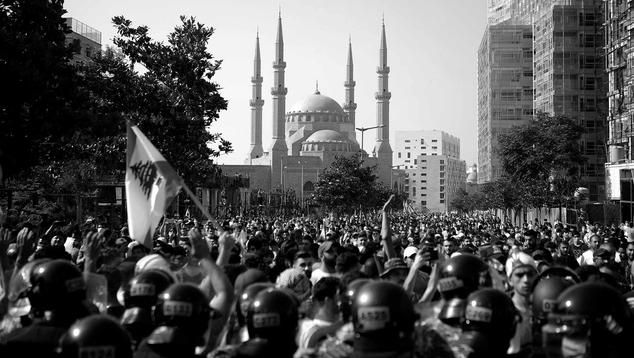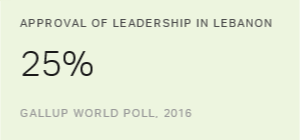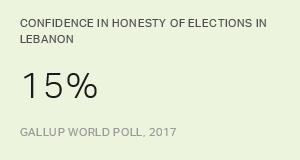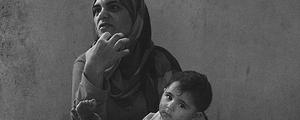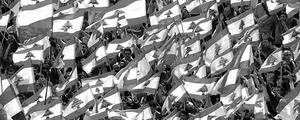Story Highlights
- Lebanese adults' life evaluations among the worst in the world
- Confidence in the nation's financial institutions plummeted in late 2019
- 92% of Lebanese adults said it is a bad time to find a job
WASHINGTON, D.C. -- Lebanese adults' ratings of their lives dropped to a historic low in 2019 as hundreds of thousands of protesters across the country -- initially angered by planned taxes on WhatsApp -- demanded the complete overhaul of the country's political system. Just 4% of Lebanese rated their lives positively enough to be considered "thriving" -- the worst score in Gallup's record for the country and one of the worst ratings in the world in 2019.
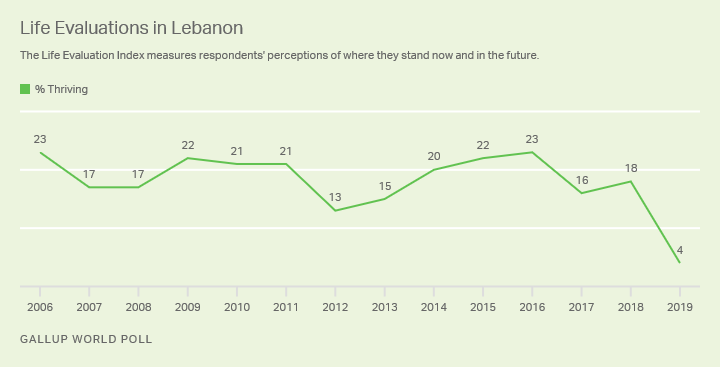
Line graph. Thriving rates in Lebanon declined to a historic low in late 2019 amid months of protests in the country.
Gallup classifies people as "thriving," "struggling" or "suffering" according to how they rate their current and future lives on a ladder scale with steps numbered from zero to 10, based on the Cantril Self-Anchoring Striving Scale. Those who rate their current life a 7 or higher and their anticipated life in five years an 8 or higher are classified as thriving.
These results are from the Gallup World Poll surveys in the country in November and December 2019 and in January 2020, as protests demanding widespread political reform were escalating.
This new low for Lebanon places it near the bottom of Gallup's 2019 global rankings of the percentage of people rating their lives well enough to considered thriving. Only Afghanistan, a nation torn by decades of war, underdevelopment and a major drug trade, had worse numbers than Lebanon. No Afghans rated their lives well enough to be considered thriving in 2019.
| % Thriving | % Thriving | ||||||||||||||||||||||||||||||||||||||||||||||||||||||||||||||||||||||||||||||||||||||||||||||||||
| Iraq | 12 | Botswana | 8 | ||||||||||||||||||||||||||||||||||||||||||||||||||||||||||||||||||||||||||||||||||||||||||||||||
| Sri Lanka | 12 | Rwanda | 8 | ||||||||||||||||||||||||||||||||||||||||||||||||||||||||||||||||||||||||||||||||||||||||||||||||
| Algeria | 11 | Egypt | 8 | ||||||||||||||||||||||||||||||||||||||||||||||||||||||||||||||||||||||||||||||||||||||||||||||||
| Madagascar | 11 | Sierra Leone | 7 | ||||||||||||||||||||||||||||||||||||||||||||||||||||||||||||||||||||||||||||||||||||||||||||||||
| India | 10 | Zimbabwe | 5 | ||||||||||||||||||||||||||||||||||||||||||||||||||||||||||||||||||||||||||||||||||||||||||||||||
| Ethiopia | 9 | Lebanon | 4 | ||||||||||||||||||||||||||||||||||||||||||||||||||||||||||||||||||||||||||||||||||||||||||||||||
| Zambia | 9 | Afghanistan | 0 | ||||||||||||||||||||||||||||||||||||||||||||||||||||||||||||||||||||||||||||||||||||||||||||||||
| Gallup World Poll, 2019 | |||||||||||||||||||||||||||||||||||||||||||||||||||||||||||||||||||||||||||||||||||||||||||||||||||
Confidence in Economy, Financial Institutions Collapses
Lebanon's crisis centers on growing discontent over worsening economic and fiscal conditions. Since the beginning of the year, Lebanese currency has depreciated by more than half of its official value. Coupled with capital control policies aimed at stopping capital flight from the nation's banks, the crisis has unleashed economic hardship not seen by most Lebanese alive today. In fact, even before the current near-to-total economic collapse, when asked in the fall of 2019 if it was a good or bad time to find a job in Lebanon, a record-high 92% described it as a bad time.
Banks have been a focus of much of the social anger expressed on the streets in Lebanon. Several branches have been burned down or destroyed by protesters frustrated with capital controls as well as a tanking exchange rate. When polling took place in 2019, banks had already begun to impose limits on dollar withdrawals before stopping them altogether in March 2020. Ahead of that, a record-low 16% of Lebanese at the time expressed confidence in their financial institutions.
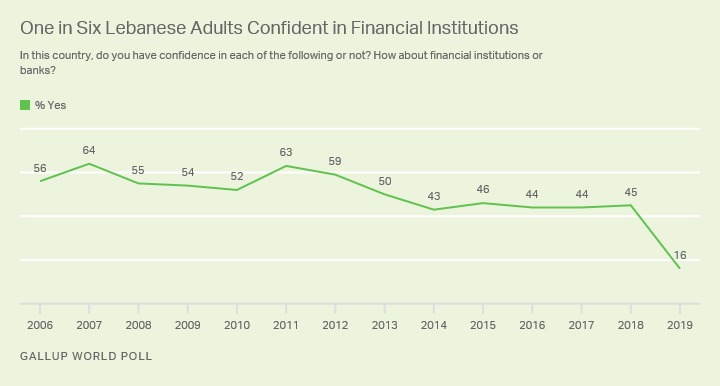
Line graph. Lebanese confidence in their financial institutions dropped to a record-low 16% in 2019.
Freedom in Life on the Decline
Lebanese people's satisfaction with their freedom to choose what they do with their lives has also seriously declined as their political and economic woes have come into tighter focus. The 44% of Lebanese who said they are satisfied with their freedom is a new low for the country -- but also one of the lowest in the world for 2019. Only Afghans (38%) and Algerians (37%) reported less satisfaction.
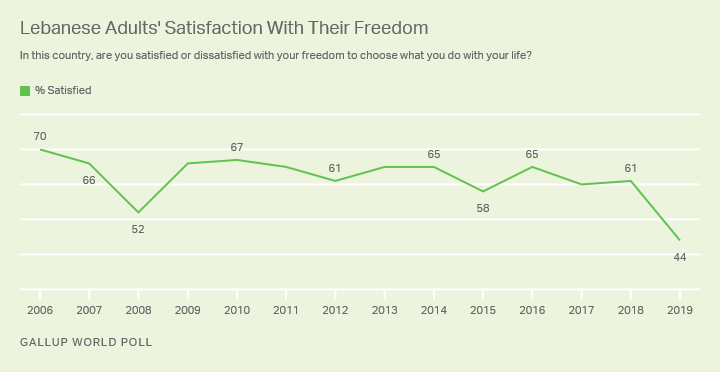
Line graph. Lebanese citizens assessments of freedom in their life decline from 61 percent to 44 percent.
Lebanon has long been a favored tourist destination for those in the Middle East and Europe because of its relatively freer social environment than most competing tourist locations in the region. However, in a country that has experienced numerous economic and political crises over the past decade, the recent downturn in assessments of freedom among Lebanese adults is a new phenomenon that should give all Lebanon observers pause.
Bottom Line
Lebanon's political turmoil and on-and-off protests demanding a wholesale cleaning out of the country's political elite coincided with an already brewing economic meltdown.
By the end of 2019, before the global pandemic lockdown began, Lebanon's economy was already in free fall. The hardships that most Lebanese are now experiencing, only exacerbated by the global economic crisis triggered by COVID-19, come on the tail end of many festering frustrations for the Lebanese people, most clearly highlighted by their own life assessments.
For complete methodology and specific survey dates, please review Gallup's Country Data Set details.
Learn more about how the Gallup World Poll works.
